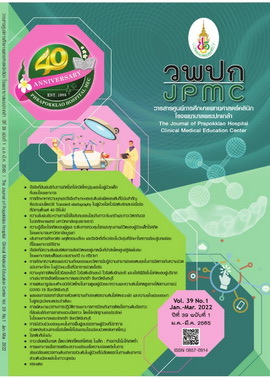The Relationship between Social Media Use with Depression and Anxiety among Medical Students at Ubon Ratchathani University
Main Article Content
Abstract
BACKGROUND: Medical students are always exposed to stress and pressure from studying so they are more at risk of developing mental health problems. Currently, medical students are increasingly using social media to reduce stress; however, excessive use can cause mental health problems.
OBJECTIVES: To study the relationship between social media use and depression and anxiety among medical students.
METHODS: A descriptive cross-sectional study was conducted among 333 first to sixth year medical students at Ubon Ratchathani University from 1 March to 31 May 2021. Data were collected by questionnaires which consisted of social media use patterns, a social media addiction test, and the Thai hospital anxiety and depression scale (Cronbach's alpha coefficient for depression sub-scale 0.83, anxiety sub-scale 0.86). Descriptive and multiple ordinal logistic regression were used to analyze the data, with a statistical significance at p<0.05.
RESULTS: Most of the respondents were females (62.0%), and most were first-year students (22.6%). 32.6% had ‘social media addiction; 23.9% had depression, and 45.4% had anxiety. After adjusting for covariates, there were statistically significant associations between the level of social media addiction and depression and anxiety. The addicted group had a 2.36 greater risk of developing depression (AOR=2.36; 95%CI=1.03-4.78). The preoccupied and addicted group had 2.13 (AOR=2.13; 95%CI=1.05-4.30) and 3.48 (AOR=3.48; 95%CI=1.64-7.39) greater risk of developing anxiety, respectively.
CONCLUSIONS: Social media use is associated with depression and anxiety among medical students. Awareness of depression and anxiety associated with social media use should be promoted in order to detect it early and prevent these issues from arising among medical students.
Article Details

This work is licensed under a Creative Commons Attribution-NonCommercial-NoDerivatives 4.0 International License.
References
We are social, Hootsuite. Digital 2020 global digital overview [Internet]. 2020 [cited 2020 Feb 18]. Available from: https://datareportal.com/reports/digital-2020-global-digital-overview
Seabrook EM, Kern ML, Rickard NS. Social networking sites, depression, and anxiety: a systematic review. JMIR Ment Health. [Internet] 2016 [cited 2021 Jan 1];3(4):e50. Available from: https://mental.jmir.org/2016/4/e50/
Lin LY, Sidani JE, Shensa A, Radovic A, Miller E, Colditz JB, et al. Association between social media use and depression among U.S.young adults. Depress Anxiety 2016;33:323-31.
Vannucci A, Flannery KM, Ohannessian CM. Social media use and anxiety inemerging adults. J Affect Disord 2017;207:163-6.
World Health Organization. Adolescent mental health [Internet]. 2021 [cited 2021 Sep 9]. Available from: https://www.who.int/news-room/fact-sheets/detail/adolescent-mental-health
World Health Organization. Mental health status of adolescents in South-East Asia: evidence for action. New Delhi: World Health Organization; 2017.
SadockBJ, SadockVA, Ruiz P. Synopsis of psychiatry: behavioral sciences clinical psychiatry. 11thed. New York: Wolters Kluwer; 2015.
Panyawong W,Santitadakul R, Pavasuthipaisit C. Prevalence of depression and suicidal risks in Thai adolescents: a survey in schools from 13 public health region. Journal of Mental Health of Thailand 2020;28:136-49.
UbonRatchathani University.Depression among student at Ubon Ratchathani University [Internet]. 2021 [cited 2021 July 10]. Available from: https://www.ubu.ac.th/web/files_up/00037f2020060915182553.pdf
Phanpanich P, Manwong M, Vongsuphakphan P, Udomsuk L. Depression in the first to third year medical students of College of Medicine and Public Health, Ubon Ratchatani University. Srinagarind Med J 2021;36:287-94.
Mirza AA, Baig M, Beyari GM, Halawani MA, Mirza AA. Depression and anxiety among medical students: a brief overview. Adv Med EducPract 2021;12:393-8.
Nguyen TH, Lin KH, Rahman FF, Ou JP, Wong WK. Study of depression, anxiety, and social media addiction among undergraduate students. Journal of Management Information and Decision Sciences2020;23(4):284-303.
Boonvisudhi T, Kuladee S. Association between Internet addiction and depression in Thai medical students at Faculty of Medicine, Ramathibodi Hospital. PLoS One.[Internet] 2017 [2021 Feb 14];12(3):e0174209.Available from: https://journals.plos.org/plosone/article?id=10.1371/journal.pone.0174209
Pernsungnern P, Pornnoppadol C, Sitdhiraksa N, Buntub D. Social media addiction: prevalence and association with depression among 7th-12th grade students in Bangkok. Graduate research conference 2014; 28 Mar 2014; KhonKaen, Thailand. KhonKaen: KhonKaen University; 2014. p. 1132-9.
Nilchaikovit T, Lortrakul M, Phisansuthideth U. Development of Thai version of hospital anxiety and depression scale in cancer patients.J PsychiatrAssoc Thailand 1996;41:18-30.
Javaeed A, Zafar MB, Iqbal M, Ghauri SK. Correlation between Internet addiction, depression, anxiety and stress among undergraduate medical students in Azad Kashmir. Pak J Med Sci 2019;35:506-9.
Kalyani b, Reddi N K, Ampalam P, Kishore R K, Elluru S. Depression, anxiety and smartphone addiction among medical students. IOSR Journal of Dental and Medical Sciences 2019;18(2):33-7.
Lei LYC, Ismail MAA, Mohammad JAM, Yusoff MSB. The relationship of smartphone addiction with psychological distress and neuroticism among university medical students. BMC Psychol. [Internet] 2020 [cited 2521 Jan1];11;8(1):97.Available from: https://bmcpsychology.biomedcentral.com/articles/10.1186/s40359-020-00466-6
Susanto H,Suryani E,Astiarani Y,Kurniawan F. Relationship between narcissism, self-esteem, and social media addiction in preclinical medical students. Althea Medical Journal2021;8:50-5.

